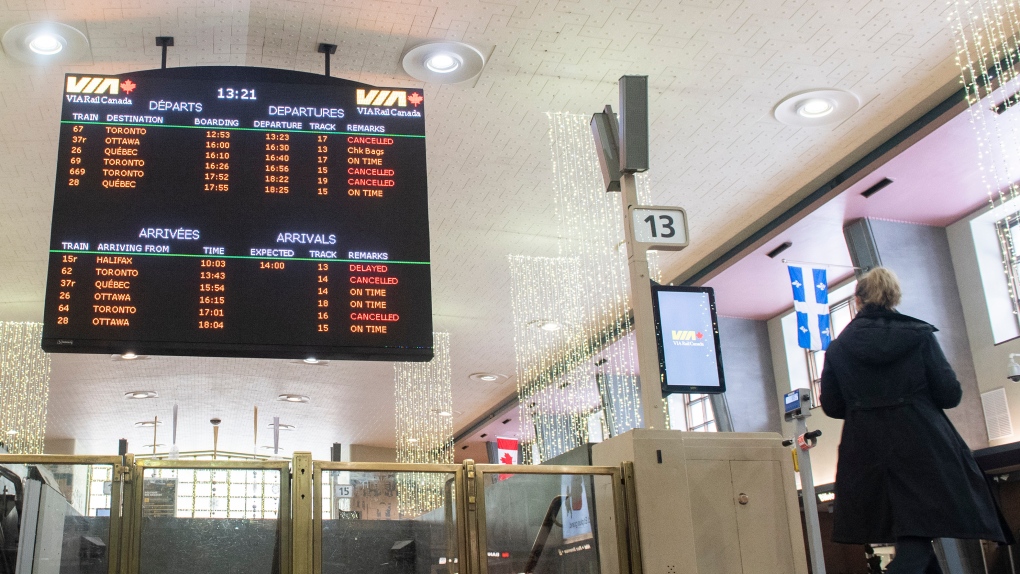Instead of hopping on a plane to travel, Michael Downie opts for the train.
"You have your bedroom, you get three meals a day, and you just look out the window and watch the country go by. You get to experience all of it," said Downie.
For the YouTube travel blogger, the journey is the trip itself.
With the spring break travel season approaching, those looking to flee the cold, wet Canadian snow for sunnier skies will likely be met with a hefty price tag for their getaway, with inflation and increased demand pushing costs up.
But Downie said there are cheaper ways to travel if you know where to look and if you're not afraid of the unconventional.
The Vancouver resident has travelled by train to most parts of Canada and the United States by Via Rail, Amtrak and the Rocky Mountaineer.
Most recently, Downie went from Jasper to Vancouver by train, as part of Via Rail's route called The Canadian which departs from Toronto and arrives in Vancouver four days later. The 24-hour stretch from Jasper to Vancouver costs as little as $190 for an economy fare or as much as $4,250 for the more luxurious option.
While on the tracks, Downie said he enjoys weaving in and out of the Rocky Mountains, stopping in Kamloops and participating in wine tastings on board the train.
"When people go somewhere warm for their vacation, and they come home and they lost their luggage, it's stressful," said Downie. On the train, "you just get to sit down, rest and relax as the train rocks back and forth. And you miss (the scenery) when you fly."
If you do choose to fly this spring, Barry Choi said those looking for a deal should avoid the week of March break if possible.
The personal finance and travel expert suggests travelling outside peak times instead, say, a week before or after. If that's not an option, Choi said travellers should consider destinations that aren't as expensive, like Portugal rather than Spain, or countries in the Middle East instead of those in Europe.
And once you're in the country, you can reduce costs by thinking more about your accommodations, noting those in the downtown core of cities cost much more than staying 15 or 20 minutes out.
"You always have to think outside the box," Choi said. Even simple things like looking for museums and attractions with free entry or loading up on groceries so you're not eating out for every meal can save you cash on your journeys abroad.
Really, it's about managing your costs as flights and hotels have become more expensive, and as travel dynamics have changed post-pandemic, Choi said.
"If you're trying to snag that last-minute deal to some far-off destination, it's just not going to happen," he said. "Most of the time if you're looking for a last-minute flight, airlines will charge even more because they know you need it."
It's important to pay attention to sales and vacation packages instead, said Choi.
Choi also recommends setting yourself up with a credit card that will earn you points toward travel.
"If you want to fly to Italy, you should start collecting Aeroplan points now," he said. Say you're not sure where you want to go, then choose any program, like American Express Membership Rewards or Scene Plus. Some credit cards also come with a "generous welcome bonus" if you can meet the minimum spending requirements.
To budget for your trip, prepare a rough estimate for what you'll spend on flights, hotels, food and entertainment, then work backwards, he said. If you're planning a trip that will cost about $3,000 and want to go in 12 months, you need to save $250 per month, for example.
Saving for travel rather than impulsively booking a trip is important, but what's more important is ensuring your debts are paid off beforehand, said financial educator Jessica Moorhouse.
"If you have really expensive credit card debt, that should be your priority because it can be a huge drain on your finances," said Moorhouse. Once that's paid off, you should also consider saving for an emergency fund which typically covers your cost of living for six months should an event occur where you can no longer work, like being laid off from a job.
Building upon Choi's recommendation to save little by little each month, Moorhouse suggests opening a separate banking account with higher interest rates for savings. Besides growing your money, keeping your savings in a separate account prevents you from spending it impulsively, she said.
While social media feeds are bound to be filled with travellers showing off their getaways this upcoming travel season, the fear of missing out shouldn't be a reason you're willing to risk your financial stability, said Moorhouse.
If you have that chance to go on a trip and you can't afford it right now, chances are there will be more opportunities to go in the future, she said.
"It sucks to go on vacation, come back home and continue paying for something that already happened. But if you find yourself in that situation, make a plan to pay it off by the end of the year at the latest."
This report by The Canadian Press was first published Jan. 31, 2023.










































